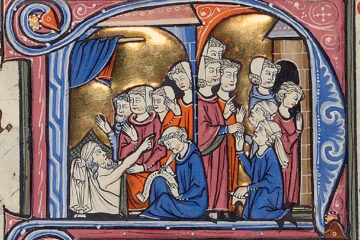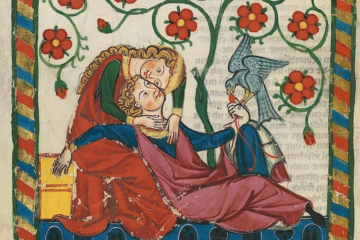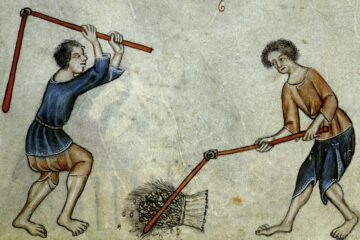by Harry Gulcher, Master of History in Rosewood
As master Winston has done before me, so too shall I do now. Before I continue I feel as though I must say this. Pope Alexander I, was a kind man and a generous one. Both benevolent and good. However, his writings on history are clear signs of some sort of affliction or illness of the mind. His writings on the history of the world and the founding of the Empire are tactless and baseless at best. At worst they are the ramblings of a madman.
Now that I have established nothing but the noblest intentions, I must start with some revision to the history of Munrich.
Munrich today is one of the three Kingdoms controlled by the Empire, although it shares a culture and identity with its southern neighbor, South Munrich. These two together form what we like to refer to as Late Munrich. A fairly large Kingdom back in the day.
Sadly Pope Alexander’s notes seem to be the only source of the events that transpired and since it’s been half a century since all this transpired, it’s beyond difficult to denote truth from fantasy.
The Death seemed to have hit Late Munrich hard, with the mountainous terrain that it used as a shield, now serving as a breeding ground for sickness. All of that seemed to subside around 1060, which is when the King and his family returned to the common folk, who were left to their own devices during the harsh times. This would of course fuel resentment within the people’s hearts towards their unfeeling overlords. In the coming months, King Jeffon abdicated in favor of his younger son Thomas. And thus, Thomas Wisser was named King of Late Munrich. His demesne included today’s region of Munrich and the Kingdom of South Munrich. A powerful monarch all in all.
Not half a decade later, King Thomas found himself in a predicament. He had spent ¾ of the treasury on lavish feasts and large games, which did serve to pacify both his nobles and peasants, but the festivities could only do so much. People began calling King Thomas “the Weak”. Either due to his inadequacy in statecraft or the fact that he was literally weak, perhaps even both.
By early 1065 the Duchies which now form South Munrich grouped up into a Coalition against the northern part of the Kingdom. The “Fool’s War” as the bards would have us know, lasted for around five years. Five years of King Thomas not listening to his military advisors and leading his army himself, without any previous experience. He sought to tame the South (much like the Emperor is doing now) and managed to get pushed back all the way to his capital city. In a spark of what some would call genius, he ordered the sick be killed and thrown over the walls onto the attackers.
Now some historians claim that it brought about the Second Death. My belief is that he was simply able to spread dysentery among the attackers and later on, his own people. Seeing a disease brewing, the Southern Duchies seceded from the Kingdom and formed their own, the Kingdom of South Munrich in 1070.
The next couple of years were awful for the now weakened Kingdom. The King and his family fell victim to the sickness and were taken within months. Power fell onto the strongest highborn who could manage to fight for and win the crown (Which is probably where Munrich got its Succession Laws from). The House of Winehouse managed to seize power and took the capital. Around 1075 is when the Empire pressed its claim onto Munrich. Most people would be outraged to know that their sovereignty was under attack by a foreign Empire. However, the people of Munrich did not know of freedom or law at the time. Warring factions scarred the land into disrepair. Munrich was quick to join in exchange for the Empire’s help in retaking its lost southern territory. But the Empire’s first war is a story of another time.
Since “the Unification” Munrich has been known as the underdeveloped part of the Empire, yet invaluable due to its natural defenses. But since 1076 and up to 1087 it has seen its fair share of rulers. They say Kings in Munrich last as long as flies, and it would seem that there is some truth to that. Its succession demands only the strongest rule, which is noble in its own way, but it promotes infighting and instability among the strongest nobles.
Sir Jamie, after winning the First Grand Tournament of Rosewood asked to be given a claim to the Munrichian throne by the Emperor himself. He received his wish. My mind would have me believe that it was more of a wish by his Queen, Her Majesty Victoria who wished to carve up Munrich between Deston and Egirth. Her wish could not come true as the Emperor felt it was time he took matters into his own hands and dealt with the issue on a much more personal level. His troops were amassed. 3.000 infantry, and additional 1.000 riders along with 600 men from his vassals. Victory seemed nothing but inevitable. Munrich had no unified army, but a few Dukes and Counts with wild ambitions, they could not possibly hope to stand up to the Emperor’s ire. Unsurprisingly now, Munrich’s greatest asset turned into the Emperor’s worst nightmare. The fortified hills and narrow passages, and the mountainous terrain proved lethal for large armies. I can almost surely say that more men died due to attrition than any battle fought.
By March of 1088, the Army had marched into Munrich. At the head was the Emperor’s Lord Marshal, James Sullivan, riding with him, Sir Argonon, Prince Albert, and Sir Joseph. As soon as they had won their first battle at Towalda, the Munrichian pretenders came to each other’s aid and unified against the Empire. By May, the Empire was looking at an army of some 2.000 strong, a fourth of which were lowly peasant levies. The Munrichians retreated to the south and left their capital open for siege. Sir Argonon led the siege, which lasted for 65 days before they were interrupted.
From the south marched an army of 4.000 strong. It would seem the leader of the Munrichians, Duke Harald Morgens signed an agreement with the King of South Munrich Robin de Rogue, where he promised him the union of Munrich and South Munrich in favor of South Munrich if they help them fend off the invaders from the north. South Munrich provided Munrich with 1.000 men and 1.000 more mercenaries. By early September 1088, the armies met near Bron, where they clashed. The Sirius Empire came out as the victor, with Sir Argonon and Prince Albert earning their peers’ praise. The Sirian forces lost around 300 men in the battle and another 100 to desertion, while the Munrichians lost 500 and a further 200 to desertion. From this point, the war would only become harder. Duke Morgens adopted a unique style of warfare where he split the main army into a dozen smaller ones, whose job was to harass the invaders. The small armies were so small that they could not be caught, and the Sirians could not afford to divert their direction to chase an army twenty times smaller than them. Bron was besieged again in October, but the siege had to be lifted due to a harsh winter. In the meantime, the Munrichians continued harassing Lord Sullivan’s detachment, even forcing him to chase them into Egirth. Come March 1089, the siege was started again and lasted for 143 days before the Sirians managed to break through and slaughter the starving defenders. Bron was taken, but the war was far from over. The Empire went on a series of sieges, but for every two keeps they took, the Munrichians retook one. It was a constant struggle for survival. In late August of 1089, the Sirian army had 3.200 men at its disposal, while the Munrichians constantly refilled their levies with the disgruntled folk. Soon on the 4th September 1089 in Norgerswen, the 3.500 strong Munrichians met the weaker 3.200 strong Sirian Army. In a show of might and tactical brilliance, Duke Morgens won against the Sirians, inflicting around 400 casualties and forcing them to retreat. Lord Marshal Sullivan was killed in the battle and Prince Albert badly hurt. They retreated back to Egirth for the coming winter and lost all the progress made. In late February 1090, the Emperor called King Andrey and Queen Victoria to the war, and they accepted. Sir Argonon, now at the head of the army led the reinforced 3.000 strong into Munrich for a second time. By March, they had met the Munrichians in battle, 3.500 of them. Against all odds, Sir Argonon bested Duke Morgens, by abusing his weakness. Undisciplined troops. The Munrichians lost near 800 men and retreated. While falling back to Bron, Duke Morgens found himself ambushed by a 2.000 strong force from Deston lead by Sir Jamie among others. Their low morale and depleted resources proved fatal. They lost another 1.000, plus the mercenaries which deserted. The Munrichian force was no more. Bron was besieged again on the 30th April 1090 and it fell only three months later. Resistance still made conquest difficult, but not impossible. There were no more major battles, just skirmishes along roads and during sieges. Eventually, the warlords of Munrich sued for peace around September 1091. The rowdiest of the rulers had their lands stripped and titles revoked before being executed for High Treason. By 1092 the war was over and stability finally a reality. Prince Albert was crowned as King on the 13th December 1092. Long may he reign and glory to the Emperor!


